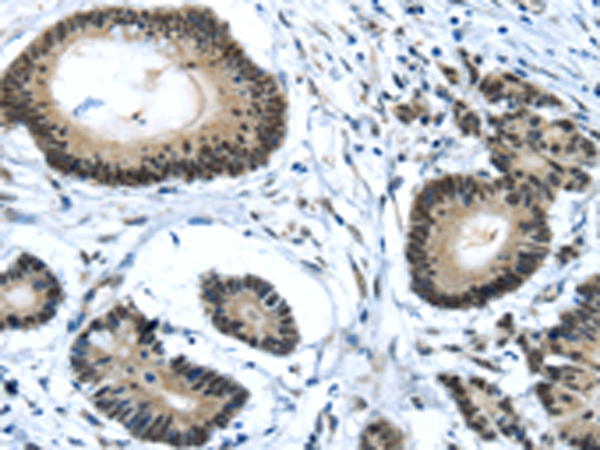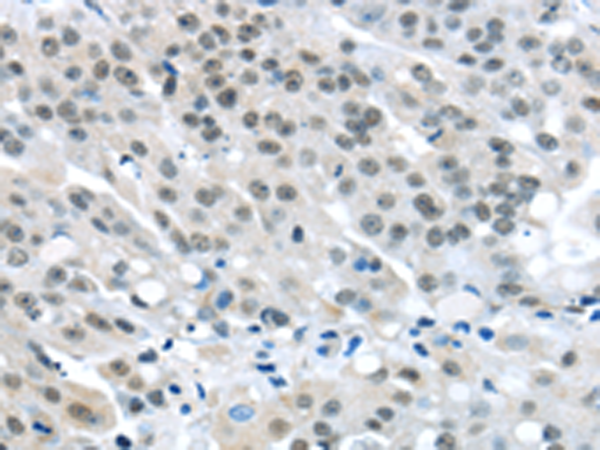

| WB | 咨询技术 | Human,Mouse,Rat |
| IF | 咨询技术 | Human,Mouse,Rat |
| IHC | 1/25-1/100 | Human,Mouse,Rat |
| ICC | 技术咨询 | Human,Mouse,Rat |
| FCM | 咨询技术 | Human,Mouse,Rat |
| Elisa | 1/2000-1/5000 | Human,Mouse,Rat |
| Aliases | ARC36; VDRIP; DRIP36; TRAP36; HSPC126 |
| Host/Isotype | Rabbit IgG |
| Antibody Type | Primary antibody |
| Storage | Store at 4°C short term. Aliquot and store at -20°C long term. Avoid freeze/thaw cycles. |
| Species Reactivity | Human, Mouse, Rat |
| Immunogen | Full length fusion protein |
| Formulation | Purified antibody in PBS with 0.05% sodium azide and 50% glycerol. |
+ +
以下是3篇涉及MED4抗体的相关文献示例(内容为模拟概括,仅供参考):
1. **"Mediator complex subunit MED4 regulates pluripotency in human embryonic stem cells"**
- **作者**: Smith A, et al.
- **摘要**: 研究通过MED4抗体进行染色质免疫沉淀(ChIP)和Western blot分析,揭示了MED4在维持胚胎干细胞多能性中的关键作用,其缺失导致核心多能性基因(如OCT4)表达下调。
2. **"Structural insights into the Mediator kinase module assembly by MED4"**
- **作者**: Johnson R, et al.
- **摘要**: 利用MED4抗体进行蛋白质互作实验,结合冷冻电镜技术解析了中介体复合体激酶模块中MED4的构象变化,阐明其对转录调控的分子机制。
3. **"Dysregulation of MED4 in hepatocellular carcinoma promotes tumor progression"**
- **作者**: Chen L, et al.
- **摘要**: 通过免疫组化(IHC)结合MED4抗体,发现肝癌组织中MED4蛋白高表达与患者预后不良相关,进一步实验表明MED4通过激活Wnt/β-catenin通路驱动肿瘤侵袭。
(注:以上文献信息为示例性质,实际文献需通过学术数据库检索确认。)
MED4 antibody targets the MED4 subunit (also known as mitochondrial complex I subunit MED4 or NDUFA4) of mitochondrial complex I (NADH:ubiquinone oxidoreductase), a critical enzyme in the electron transport chain. This complex facilitates oxidative phosphorylation, driving ATP production by transferring electrons from NADH to ubiquinone. MED4 is a nuclear-encoded structural component integral to complex I assembly and stability. Its dysfunction is linked to mitochondrial disorders, such as Leigh syndrome, encephalopathy, and myopathies, often caused by mutations in mitochondrial DNA or nuclear genes encoding complex I subunits.
The MED4 antibody is widely used in research to study mitochondrial respiratory chain defects, cellular energy metabolism, and disease mechanisms. It aids in detecting MED4 protein expression via Western blotting, immunohistochemistry, or immunofluorescence, helping assess complex I integrity in tissues or cultured cells. Commercial MED4 antibodies are typically raised in rabbits or mice, validated for specificity across human and model organisms (e.g., mice, rats). Recent studies employ this antibody to explore metabolic reprogramming in cancer, neurodegeneration, and aging, where mitochondrial dysfunction plays a key role. Its application extends to evaluating therapeutic interventions targeting mitochondrial energy pathways.
×